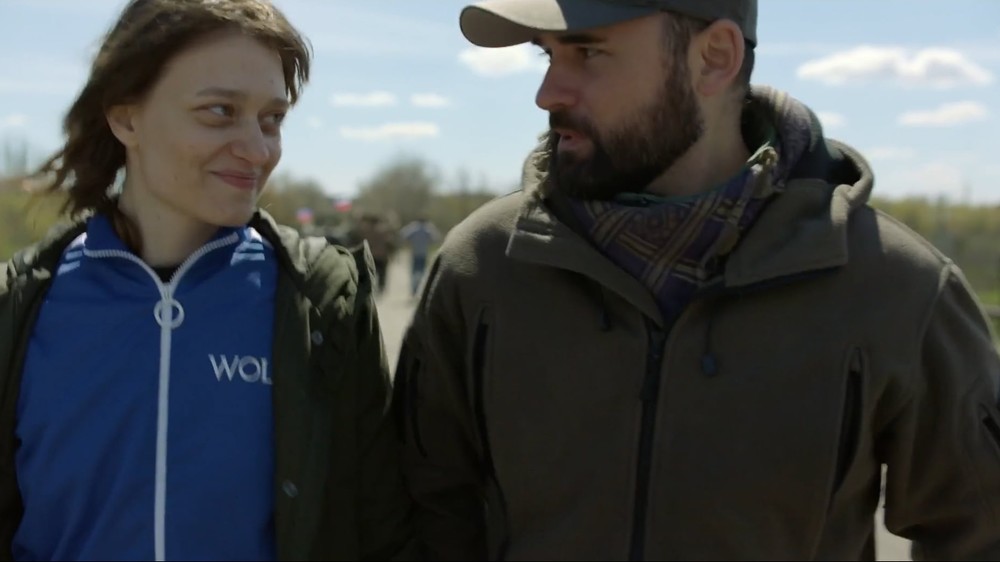Regard to Ukraine| Anonimul 2022
Usually dedicated to a mini-retrospective of a given filmmaker, the international off-competition section of Anonimul Film Festival’s 2022 edition has turned into a much-welcome regard to Ukraine. This allows us to add a few more precious pieces to the increasingly complex puzzle of the region’s young cinema.
Despite its rather small number of players, the Ukrainian selection brought to the festival a surprisingly generous range of possibilities in terms of counteroffensives, denouncements, and observations that the country’s filmmakers have in their arsenal, as they attempt to turn the current situation into the prime matter for fiction. Let’s start off by saying that the act of watching Ukrainian films that discuss war under various forms into an experience that might be quite difficult to bear, because the justifiable vehemence of these projects risks spilling over into an “all-is-permitted” type of discourse, which is completely perishable in the face of time. In fact, ever since Donbas (Sergey Loznitsa, 2018) and Atlantis (Valentyn Vasyanovych, 2019), I could gather a sort of global apprehension that gripped the local film industry, leading to a long-lasting infusion of these creative experiences, until they achieved a sort of militarized, testosterone-laden atmosphere that goes way beyond the immediate urgencies of war. I’ll be quick to say – aware of the heavy weight of these morally binary times in which we’re living in – that the necessity of these films is in no way invalidated by their tempestuous discourses, which all too often end up resembling a form of blindness, even considering that it’s perfectly justifiable. But I expect and hope that, once the dust settles back (as soon as possible, hopefully), there will be some sort of triaging of propagandist samples and the films that felt the need to make us see something else, without forcing our gaze in any single way.
In this text, I won’t stop on the worthy winner of the feature film competition, 107 Mothers, a Slovak/Czech/Ukrainian coproduction about a female prison from Odesa – a welcome counter shot to the clashes on the frontline, where various barks like “hands up!” and “get down!” become badges of nobility. I’m rather more interested in Butterfly Vision, the debut feature by Maksym Nakonechnyi, because it lands smack in the middle of all these complex negotiations that I discussed earlier, between the “too much” of publicity-esque escapism and the “way too much” of nationalist dogma. In fact, what seemed to start off like another variation on the topic of the “ravages of war” (obligatory quotation marks for an overused expression) quickly turns out to be a film that is defiant towards the official discourses that are proliferated by both camps, which he decides to clash together with a critical flick of the wrist, with only their fundamental hollowness remaining after the end of their skirmish.

The film follows the days of post-traumatic stress of a Ukrainian POW who has returned home (Rita Burkovska), where she is forced to come to terms with more than just the pain of her memories, but also with a media frenzy and an unbalanced husband. His initial intuition is to set forth of this trajectory with zeal and goodwill, only for him to slowly let us understand that it was all just irony and vanity. The details accumulate sparingly: we see a nationalist flag in red and black hanging on the wall of the husband – a skinhead grafted into the service of the fatherland – we see an insurgent’s uniform, and we see that he speaks Ukrainian with an accent (he had fled Donbas after the onset of the war), and, finally, we see how his gang razes a temporary Roma camp to the ground with their axes, killing one of its inhabitants in the process. Judging his actions is no easy task: the film precisely makes the most of all these sorts of exonerations that are facilitated by the cruel reality of war, which make us regard his abusive outbursts – he destroys a room when he learns his wife has been raped by the Russians, etc – as the result of his remorse and helplessness. In a way, in his case, this indecision works all the better; but it’s much too generously cultivated when it comes to the woman, who decides to keep the baby, only to put it up for adoption without any clear motives, which isn’t necessarily bad, had the film given the impression that it, itself understands them any better.
There’s another contested battlefront in Butterfly Vision: that of form, caught between the desire to assert weighty things and the aspiration to rise from the ground, like a butterfly in flight. Its conflictual scheme, which the film cannot escape, only with broken wings – but not without a dose of visual panache that makes one curious about Maksym Nakonenchnyi’s future work. Point in case: this choice of rendering the traumatic resurgence of the past in the protagonist’s mind by using glitches – dead pixels that simply erupt onto the screen – is not fully convincing: it’s too in-your-face yet insufficiently justified, as if the woman would be a cyborg with a faulty core chip. But the film’s impulse to leisurely mix formats – a TV broadcast shot in single-take that is not manneristic here, a TikTok-esque video there – is a testament to this debutante filmmaker’s project of grappling with the ever more diverse formats of the image. For the moment, the game is somewhat stiff (it could have done with a more playful touch in its editing) yet touching (these successors to the audiovisual media that we are led through look cheap and amateurish), but it may evolve into a self-contained reflection on the properties of the image and its functions in troubled times.
Title
Butterfly Vision
Director/ Screenwriter
Maksym Nakonechnyi
Actors
Rita Burkovksa, Lyubomyr Valivots
Film critic and journalist; writes regularly for Dilema Veche and Scena9. Doing a MA film theory programme in Paris.


